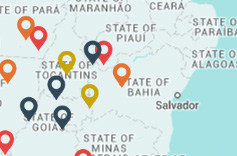Popular World Cup and Olympics Committee of Rio de Janeiro
Violation of Human Rights in the Olympic City: Popular mobilization and struggle for the right to the city
Rio de Janeiro
Objetivos e público prioritário
Through this initiative, we intend to call attention to the true legacy of sporting mega-events: a more unequal city that excludes thousands of families and destroys entire communities and the appropriation of the majority of its benefits to a few social and economic agents. Based on the right to the city, that is, the right of citizens to access and participation in related discussions and decisions, the goal is to intensify the struggle and resistance against the Olympic Project marked by processes of exclusion and social inequality.
Main activities
– Community debates with the goal of exchanging experiences on the impacts of large sporting events in terms of the right to housing. Furthermore, a football tournament in stages, the “Popular Cup: Against Removals” which will try to dialogue with community residents through sports;
– Debates with the goal of reaching new audiences – and which will also be inserted into discussions on the preparations for mega-events;
– Access to information: the Rio de Janeiro dossiers were released in 2012 and 2013 with detailed information about rights violations underway in the city;
– Committee Marketing materials: tee-shirts, stickers, headbands and pamphlets to be distributed at activities related to the topic of sporting mega-events;
– Participation in the First Encounter of those Affected by Mega-Events and Mega-Projects in Brazil.
Context
Rio de Janeiro is the setting for several events in preparation for the 2014 World Cup and 2016 Olympic Games. The events include new sports stadiums, renovations of existing equipment and public spaces, such as Maracanã Stadium, field infrastructure for urban mobility and urban restructuring projects.
More than 100,000 people are being removed or threatened with removal in processes that are often violent, illegal and lack guarantees for their resettlement in an adequate locale with fair indemnities. The expansion of the urban perimeter is being carried out without proportionate investments in infrastructure, especially sanitation, and without any guarantee of access to public services and equipment, causing the low-income population to be pushed out to ever more distant locations. Projects in preparation for the mega-events have violated workers’ rights and failed to guarantee adequate safety, as seen in denunciations from workers during recurring strikes. Finally, there has been no transparency in the use of public resources and decisions on investments are made without the participation of the population.
About the organization
The mission of the Popular World Cup and Olympics Committee of Rio de Janeiro is to mobilize a wide-spread network of social organizations, popular movements, trade unions, organs in defense of rights and public budgetary control, universities, with the empowerment of the directly and indirectly affected communities to monitor public and private interventions and coordinate actions on topics such as transparency and access to information; workers’ rights; the end of removals under the pretext of the World Cup and Olympics; social legacy and increase of rights.
Partnerships
The Olympics and World Cup People's Committee of Rio de Janeiro is part of the National Network of Popular World Cup Committees (ANCOP).
Results
The Rio People’s Committee held planned activities under the project, such as public acts, demonstrations, lectures, seminars and releasing the dossier denouncing human rights violations, in addition to other activities that were defined as priorities during the plenaries. The protagonism of the afflicted people in the various actions that were realized deserves to be highlighted, such as the participation in public audiences and in the construction and definition of the actions realized, many of which took place inside the affected communities. Another highlight was the large amount of information produced and disseminated in dossiers and in debates and interviews, nationally and internationally.
Funding Line
Mega-Events (2014)
Year
-
Total Granted
R$ 30,000
Duration
9 months
Main Themes
The right to just and sustainable cities






